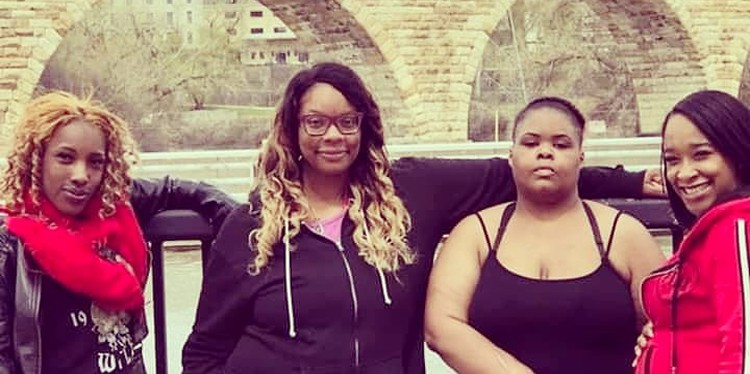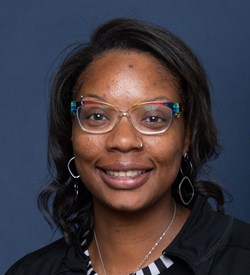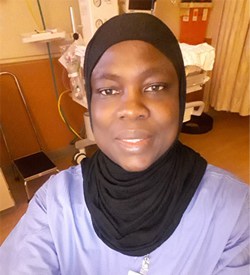Black Maternal Health Week: Through the eyes of two Black doulas

Black Maternal Health Week (BMHW) – April 11 through 17 – is a national campaign led by the Black Mamas Matter Alliance. Its goal is to “amplify the voices of Black mamas and center the values and traditions of the reproductive and birth justice movements.” In a country where Black women are four times more likely than white women to die from pregnancy or giving birth, this is a national crisis.
BMHW is a call to closely inspect the structures and systems in place that contribute to poor outcomes for pregnant women, especially those of color. It’s a call to “meaningfully shift the numbers by considering solutions – without fear, blame, or shame” and secondly, to recognize the contribution of of Black mothers, including motherhood, scholarship, leadership, and research.
We interviewed two Black doulas to get their perspectives on BMHW and what it means to them. Sierra Williams and Hadijatou Sanyang are doulas with Everyday Miracles. Hennepin Healthcare contracts with Everyday Miracles to provide doula care for patients who have their babies at the Birth Center. A doula is a labor support person, not a medical staff member, who can advocate for, listen to, and support laboring moms.
The interview
Tell us about your background and what inspired you to become a doula.

Sierra: I have been a doula for six years. Previous to that, I worked in healthcare in several roles, including as a surgical tech, medical billing, and coder, as well as some customer service roles. For three years, I worked inside the local prisons/workhouse as a doula. My decision to become a doula was a culmination of two events: As a child, I originally aspired to be a midwife, however, I ended up pursuing the alternative and became a doula. The biggest impact that influenced my decision to become a doula was my own birth experience at the age of 15. At the time, my doula helped me throughout my pregnancy and was a champion partner and advocate.
 Hadijatou: I am a pre-nursing student as well as a doula. I was inspired to become a doula after witnessing the birth of my niece. My sister gave birth early due to preeclampsia. She was in between moving from Texas to Florida and without a permanent address, she was not eligible for health insurance. I watched her being mistreated by healthcare staff on both fronts, being a person of color as well as not having insurance. When I compare her birth story to mine, where I had a supportive doula and midwife, I see such a huge difference. I also see the difference I can make in others’ lives as their doula.
Hadijatou: I am a pre-nursing student as well as a doula. I was inspired to become a doula after witnessing the birth of my niece. My sister gave birth early due to preeclampsia. She was in between moving from Texas to Florida and without a permanent address, she was not eligible for health insurance. I watched her being mistreated by healthcare staff on both fronts, being a person of color as well as not having insurance. When I compare her birth story to mine, where I had a supportive doula and midwife, I see such a huge difference. I also see the difference I can make in others’ lives as their doula.
Why do we need a Black Maternal Health Week, in your opinion?
Sierra: Awareness is huge: The number of women who die during childbirth in the Black community is disturbing, especially because most of the deaths are preventable. If we do not bring awareness to the situation it will not change; it will stay the same or get worse.
Hadijatou: BMHW is as crucial for educating the general public as it is for educating the Black community on their reproductive and patient rights. We all need to become aware to avoid scenarios like my sister’s birth experience. My sister was sent home after giving birth, even when she was not feeling well. She mentioned this to the doctor, but he dismissed her with “You do not have insurance.” It was later discovered that the left side of her heart was failing, and fluid had built in her lungs.
Black Maternal Health Week has spurred necessary action such as last year when Senator Harris introduced the Maternal Care Access and Reducing Emergencies Care Act. The bill will help to reduce racial disparities in maternal health by addressing the implicit bias and discrimination Black women experience while engaging with the healthcare system. This has brought national attention to the Black maternal mortality crisis, which will help bring an end to experiences like my sister’s.
What have you heard from Black birthing people about their experiences birthing in hospitals?
Sierra: Being that I am a Black woman and have given birth five times, I have my own experiences. I have felt shame from healthcare workers not having the father present at the birth. I have had nurses treat me very poorly and say rude comments. I have also had very kind nurses who have stayed past their shift to make sure the care I received was topnotch. As a doula, I’ve seen a number of egregious things, including families being treated unfairly and Black women being told they need to get birth control while in the hospital.
Hadijatou: I have heard a number of things from Black mothers, in many instances they feel voiceless or powerless. Concerns I’ve heard are:
- Providers did not follow my birth plan.
- Providers ignored my wishes.
- Providers did not acknowledge my beliefs.
- I do not trust the health providers because my mom, aunt, or sister has been mistreated.
In your opinion, how could hospitals improve the care they provide to Black birthing people?
Sierra: One of the best ways to improve care to simply ask patients what they need. We can develop dialogue with the Black community, allowing them to share their experiences and feedback. As with anything, we can get more participants by providing an incentive. Also, conduct follow up calls or surveys to see how patients rate the care they received. There are always ways to improve.
Hadijatou: Hospitals have to set a precedent for or seriously revisit their discrimination policy, where all patients are treated the same no matter their race, color, creed, religion, age, sex, disability, marital status, etc. Active listening to and compassion for birthing mothers is essential. Judgement needs to be held in check if, in fact, the mother and baby’s physical, emotional and mental wellbeing is the priority. Hospitals can also set goals to specifically improve their care for Black birthing mothers.
Thank you Sierra and Hadijatou
We thank Sierra and Hadijatou for sharing their personal experience and feelings on the topic of Black maternal health. Hennepin Healthcare considers maternal health of utmost importance, particularly for our Black and Native American communities. Culturally specific prenatal care for both groups, created from community feedback, will launch in the near future. In addition, doula care remains integral for laboring moms in our Birth Center.
May we as a healthcare community honor Black Maternal Health Week by reflecting on how racism is at work within ourselves and institutions. May we learn from experts in this field, such as the leaders interviewed here as well as the Black Mamas Matter Alliance. May we today and every day, listen to Black birthing people.
1 Comments
Leave a Comment
You must be logged in to post a comment.


Congrats Sierra on your practice! I am so proud of your journey!! What an important role to take on.